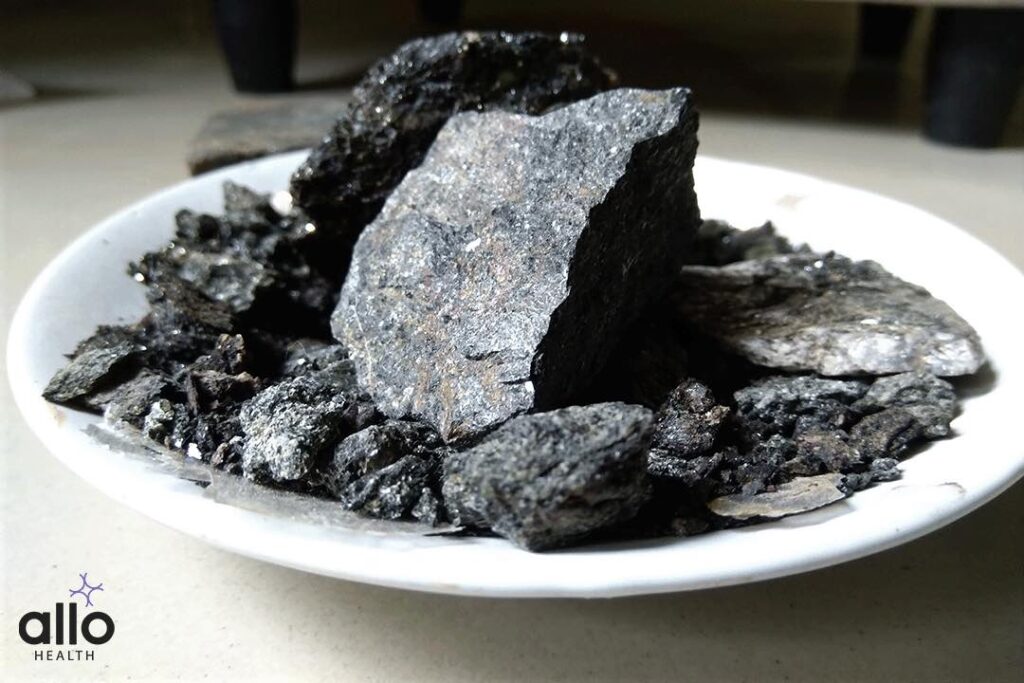Does Himalaya Shilajit Really Work?

Allo Health is dedicated to personalized well-being, offering support and trusted information tailored to individual health goals. The platform emphasizes human-generated content, led by a distinguished medical team of experts, including physicians and sexual health specialists. Their commitment to credibility involves rigorous fact-checking, authoritative research, and continuous updates to ensure accurate, up-to-date information. Allo Health's unique approach goes beyond conventional platforms, providing expert-led insights and a continuous commitment to excellence, with user feedback playing a crucial role in shaping the platform's authoritative voice.

Dr.Sushma.V completed MBBS degree from BGS GIMS,bangalore
Why This Was Upated?
Our experts continually monitor the health and wellness space, and we update our articles when new information became available.
Updated on 26 December, 2023
- Article was updated as part of our commitment to diversity, equity, and inclusion.

"The following blog article provides information about a drug or brand name drug and its potential effects or benefits. However, it is crucial to understand that this information is intended for general educational purposes only and should not be considered a substitute for professional medical consultation. It is highly recommended to consult with a qualified healthcare professional before making any decisions regarding medication, treatment, or healthcare management.
Book consultation
Individuals have unique medical conditions, and the information provided in this article may not be applicable to everyone. Only a qualified healthcare provider can evaluate your specific medical situation, taking into account your medical history, conducting appropriate tests, and providing personalized advice and recommendations. They are equipped to make informed decisions tailored to your individual needs.
It is crucial to emphasize that self-diagnosis, self-medication, or disregarding medical advice can have serious health consequences. This article may reference specific brand names or drugs for illustrative purposes. Mention of these names does not imply endorsement, recommendation, or guarantee of their efficacy or safety. The choice of medication should be based on discussions and individualized guidance from a healthcare professional who has a comprehensive understanding of your medical condition.
"Are you looking for a natural supplement that can help improve your overall health? Look no further than Himalaya Shilajit, a powerful substance that has been used in Ayurvedic medicine for centuries. From boosting energy levels to supporting heart health, there are many benefits to incorporating this ancient substance into your daily routine.
What Is Himalaya Shilajit?
Himalaya Shilajit, also known simply as “Shilajit,” is a sticky, tar-like substance that is found primarily in the rocky mountains of the Himalayas, Altai, Caucasus, and other mountain ranges. It is a natural mineral resin that oozes from rocks in these high-altitude regions as a result of the decomposition of plant and microbial matter over centuries. Shilajit has been used for centuries in traditional Ayurvedic medicine and other traditional systems of medicine for its potential health benefits.
Composition
Shilajit is composed of a complex mixture of organic and inorganic compounds. It contains various minerals, fulvic acid, humic acid, triterpenes, and other bioactive components. The exact composition can vary depending on the geographical location from which it is sourced.
Potential Health Benefits
Shilajit has been used traditionally as a rejuvenating and revitalizing substance, believed to promote overall health and well-being. It is often touted to have various potential health benefits, although scientific research on some of these claims is limited and ongoing. Some of the commonly attributed benefits include:
- Energy and Vitality: Shilajit is often considered an adaptogen, which means it may help the body adapt to stress and promote energy and vitality.
- Cognitive Health: It is believed to support cognitive function and memory, although concrete scientific evidence is still being established.
- Anti-Inflammatory: Shilajit contains compounds with potential anti-inflammatory properties that may contribute to reducing inflammation in the body.
- Antioxidant: Some components of Shilajit have antioxidant properties, which can help neutralize harmful free radicals and protect cells from oxidative stress.
- Immune Support: It is believed to support the immune system, although more research is needed to confirm its specific effects.
- Anti-Aging: Due to its traditional use as a rejuvenating substance, Shilajit is sometimes associated with anti-aging benefits, although this claim requires further scientific investigation.
Usage
Shilajit is usually consumed in small amounts as a supplement. It is available in various forms, including capsules, powders, and resin. It is often mixed with water, milk, or other liquids before consumption. Traditional Ayurvedic texts recommend using Shilajit in combination with other herbs for enhanced benefits.
Safety and Considerations
While Shilajit has a long history of use in traditional medicine, it’s important to exercise caution when using it as a supplement. Quality control can be a concern, as the purity and composition of Shilajit can vary. Also, its safety during pregnancy, breastfeeding, or in certain medical conditions hasn’t been fully established, so it’s advisable to consult a healthcare professional before using it.
What Is Himalaya Shilajit Used For?
Himalaya Shilajit has been used for a variety of purposes in traditional Ayurvedic medicine and other traditional healing systems. Its historical use spans centuries, and it is considered a potent and rejuvenating substance. However, it’s important to note that while many claims about its benefits exist, scientific research on its effectiveness for some of these purposes is limited and ongoing. Here are some of the common uses of Himalaya Shilajit:
- Rejuvenation and Vitality: Shilajit is often associated with promoting overall vitality and rejuvenation. In traditional systems, it is believed to enhance energy levels, support stamina, and help the body adapt to stress. It is considered an adaptogen, a natural substance that helps the body cope with various stressors.
- Cognitive Health: Shilajit has been traditionally used to support cognitive function and enhance mental clarity. It is believed to nourish the brain and nervous system, potentially improving memory, focus, and concentration. However, concrete scientific evidence supporting these claims is still emerging.
- Anti-Aging: One of the traditional uses of Shilajit is its association with anti-aging properties. It is believed to have rejuvenating effects on the body, potentially slowing down the aging process and promoting overall youthfulness. Again, this claim lacks robust scientific validation.
- Immune System Support: Shilajit is sometimes used to support the immune system’s functioning. It is believed to strengthen the body’s defense mechanisms, helping it better resist infections and diseases. However, more research is needed to establish its precise effects on the immune system.
- Anti-Inflammatory Effects: Certain compounds in Shilajit have been studied for their potential anti-inflammatory properties. It is believed that these properties can help reduce inflammation in the body, which is associated with various health conditions. However, further research is required to better understand the mechanisms and extent of these effects.
- Antioxidant Protection: Shilajit contains antioxidants that can help counteract oxidative stress caused by harmful free radicals. This antioxidant activity may contribute to overall health and the prevention of various diseases.
- Nutrient Absorption: Some traditional beliefs suggest that Shilajit can enhance the absorption of nutrients from the foods we consume. It is thought to improve the body’s ability to assimilate essential vitamins, minerals, and other nutrients.
- Male Sexual Health: Shilajit has been used traditionally as a remedy for male sexual health concerns. It is believed to enhance libido, support reproductive health, and improve fertility. However, more scientific research is needed to substantiate these claims.
- Diabetes Management: In traditional medicine, Shilajit has been used to assist in managing diabetes. Some studies have suggested that it might have a positive impact on blood sugar levels, but more research is required to validate these findings.
- Joint and Bone Health: Due to its potential anti-inflammatory properties, Shilajit is sometimes used to alleviate joint pain and promote joint and bone health.
Does Himalaya Shilajit Really Work?
The effectiveness of Himalaya Shilajit is a subject of ongoing research and debate. While it has a long history of use in traditional medicine systems like Ayurveda, scientific evidence regarding its efficacy for various health claims is still limited and often inconclusive. Here’s a more detailed look at the current state of research on Himalaya Shilajit:
- Limited Scientific Studies: There is a relatively small body of scientific research on the effects of Shilajit, and many of the existing studies are preliminary or conducted on animals or in vitro (test tube) settings. Human clinical trials, which provide more reliable evidence, are relatively scarce.
- Potential Benefits: Some studies and traditional use suggest that Shilajit may have potential benefits in terms of energy, cognitive function, antioxidant effects, immune support, and anti-inflammatory properties. However, the extent of these effects and their consistency across different individuals and populations is not well-established.
- Energy and Vitality: There are some animal studies that suggest Shilajit might enhance mitochondrial function, which is related to energy production in cells. However, translating these findings to human benefits requires more research.
- Cognitive Health: While there are claims that Shilajit supports cognitive function, concrete scientific evidence in this area is lacking. Few studies have directly examined its effects on cognitive performance in humans.
- Antioxidant and Anti-Inflammatory Effects: Certain compounds found in Shilajit do have antioxidant and anti-inflammatory properties in laboratory settings. However, whether these effects translate to meaningful health benefits in humans requires further investigation.
- Male Sexual Health and Fertility: There is some limited evidence that Shilajit might have positive effects on male sexual health and fertility, possibly due to its potential to influence testosterone levels and reproductive parameters. Nonetheless, more research is needed to establish these effects and their mechanisms.
- Diabetes Management: A few studies have suggested that Shilajit might have potential benefits for managing blood sugar levels in diabetes. However, these studies are limited in scope, and more rigorous research is necessary to draw definitive conclusions.
- Safety and Quality Concerns: One major concern is the purity and quality of Shilajit supplements available on the market. The composition of Shilajit can vary widely depending on its source, processing methods, and the presence of contaminants. This can impact its potential effects and safety.
- Individual Variation: As with many natural supplements, the effects of Shilajit may vary from person to person. Factors such as genetics, lifestyle, underlying health conditions, and dosage could influence the outcomes.
Side Effects of Himalaya Shilajit
While Himalaya Shilajit is generally considered safe for many people when used appropriately and in moderation, there are potential side effects and considerations to be aware of. It’s important to remember that the safety and side effects of any supplement can vary based on factors like individual health conditions, dosage, and product quality. Here are some potential side effects and considerations associated with Himalaya Shilajit:
- Allergic Reactions: Some individuals may be allergic to components of Shilajit. Allergic reactions could manifest as skin rashes, itching, swelling, or difficulty breathing. If you experience any allergic symptoms, discontinue use and seek medical attention.
- Heavy Metals and Contaminants: The purity and quality of Shilajit supplements can vary greatly depending on the source and manufacturing processes. Shilajit harvested from certain regions could potentially contain heavy metals or other contaminants that might have negative health effects.
- Interactions with Medications: Shilajit might interact with certain medications. If you are taking medications for conditions like diabetes, blood pressure, or blood thinning, it’s important to consult a healthcare professional before using Shilajit, as it could potentially alter the effects of these medications.
- Hormonal Effects: Shilajit is sometimes associated with effects on hormonal balance, particularly testosterone levels. While some people may view this as a benefit, it could also pose risks, especially for individuals with hormone-sensitive conditions like certain types of cancer.
- Digestive concerns: Some individuals might experience digestive discomfort, including upset stomach or diarrhea, when taking Shilajit. This is more likely to occur if the supplement is taken on an empty stomach or in excessive amounts.
- Blood Sugar Levels: Shilajit has been suggested to have an impact on blood sugar levels. If you have diabetes or are at risk of hypoglycemia (low blood sugar), it’s essential to monitor your blood sugar closely if you decide to use Shilajit, as it could potentially affect your glucose levels.
- Pregnancy and Breastfeeding: The safety of using Shilajit during pregnancy and breastfeeding has not been well established. It’s advisable for pregnant and breastfeeding women to avoid using it to prevent potential risks to themselves and their infants.
- Kidney Health: In some cases, Shilajit might exert effects on the kidneys. If you have kidney concerns or a history of kidney stones, using Shilajit could potentially exacerbate these conditions.
- Dosage and Duration: Taking excessive amounts of Shilajit or using it for prolonged periods could increase the risk of side effects. Always follow the recommended dosage instructions on the product label or as advised by a healthcare professional.
- Quality and Authenticity: Because Shilajit supplements vary in quality and authenticity, it’s crucial to purchase products from reputable and trusted sources. Low-quality or adulterated Shilajit could pose additional risks.Frequently Asked Questions
(1) What is Himalaya Shilajit?
Himalaya Shilajit is a natural tar-like substance found in the mountains of the Himalayas and other regions. It is formed from decomposed plant and microbial matter and is used in traditional medicine for its potential health benefits.
(2) How is Himalaya Shilajit used?
Himalaya Shilajit is typically consumed as a supplement in various forms such as capsules, powders, or resin. It’s often mixed with water, milk, or other liquids before consumption.
(3) What are the potential benefits of Himalaya Shilajit?
Himalaya Shilajit is believed to offer benefits like energy enhancement, cognitive support, immune system boost, and potential anti-inflammatory and antioxidant effects. However, more research is needed to confirm these effects.
(4) Are there any side effects of using Himalaya Shilajit?
Possible side effects of Himalaya Shilajit include allergic reactions, digestive discomfort, hormonal effects, and interactions with medications. Quality and dosage play a role in determining potential adverse reactions.
(5) Can Himalaya Shilajit improve energy levels?
Some studies suggest that Shilajit might enhance energy production at the cellular level. However, its impact on energy levels can vary among individuals.
(6) Is Himalaya Shilajit safe during pregnancy and breastfeeding?
The safety of using Shilajit during pregnancy and breastfeeding is not established. It’s generally recommended to avoid using it during these periods.
(7) Does Himalaya Shilajit enhance cognitive function?
While traditional use and some research hint at cognitive benefits, concrete evidence of Shilajit’s effects on cognitive function is limited.
(8) Can Himalaya Shilajit improve male sexual health?
Shilajit has been traditionally used to support male sexual health, but scientific research is needed to validate its effectiveness in this regard.
(9) How should I choose a quality Himalaya Shilajit supplement?
Choose products from reputable sources that provide information about purity, sourcing, and testing. Ensuring authenticity and quality is crucial to reduce risks.
(10) Can Himalaya Shilajit help with diabetes management? Limited studies suggest Shilajit might have positive effects on blood sugar levels, but further research is required to establish its role in diabetes management. Always consult a healthcare professional before making any changes to your diabetes treatment plan.







































